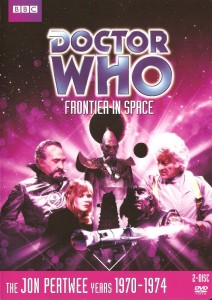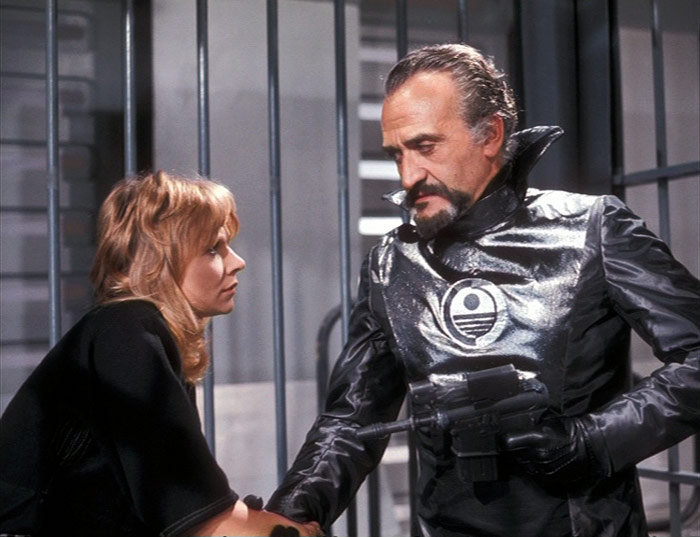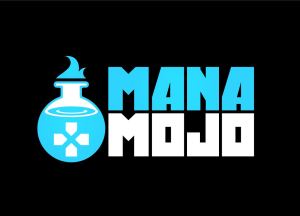 Welcome to the forty-first instalment of Who Review, my ongoing quest to review all available episodes of TV’s longest running SF series, Doctor Who. This week, the Doctor confronts two of his deadliest enemies in Frontier in Space.
Welcome to the forty-first instalment of Who Review, my ongoing quest to review all available episodes of TV’s longest running SF series, Doctor Who. This week, the Doctor confronts two of his deadliest enemies in Frontier in Space.
EPISODES
Frontier in Space
BROADCAST DATES
24 February – 31 March 1973 (6 episodes)
THE DOCTOR
Jon Pertwee
THE COMPANIONS
Jo Grant
THE EPISODES
In the 26th century, the TARDIS narrowly avoids a collision with an Earth cargo ship before materialising in the cargo hold. Jo and the Doctor investigate. Through a porthole, Jo spies another ship approaching, one that suddenly shimmers and changes shape, transforming into a Draconian battlecruiser.
In the cargo ship’s cockpit, the pilots, Stewart and Hardy, send out a distress signal and prepare for an attack. Hardy stumbles upon the Doctor and Jo while collecting weapons, but he sees them as Draconians and takes them prisoner.
On Earth, the President and her military chief General Williams meet with the Draconian ambassador. Both accuse the other of violating the frontier established by treaty between the two Empires. General Williams is particular hostile to the Draconians. In the past, his actions led to war between them, and the Draconian ambassador believes he seeks war once more. As news of the attack on the cargo ship spreads and anti-Draconian riots break out on Earth, the two Empires find themselves on the brink of war.
Imprisoned on the cargo ship, Jo comments on a strange sound heard before the attacking ship shimmered and changed, and the Doctor deduces that the sound was a form of sonic hypnosis that causes the target to see their greatest fears.
Meanwhile, the boarding party of the attacking ship begin their attack. They are not Draconians, but the mercenary race known as Orgons! They stun the pilots and steal the cargo and the TARDIS.
When the rescue party arrives, Hardy and Stewart have stopped hallucinating, but with their memories garbled, they accuse the Doctor and Jo of being Draconian spies. They are locked up and returned to Earth.
Arriving on Earth, they are taken to General Williams, who brings them to the Draconian Ambassador. The Doctor denies the claims and puts forward a new theory: a third party is trying to provoke the Empire’s into war. Unfortunately, he cannot back up his claims, so he and Jo are taken for interrogation.
Seeking to question the Doctor, the Draconians stage an escape. Jo is recaptured, but the Doctor is taken by the Draconians to the Ambassador. The Doctor manages to escape but is recaptured by the humans and returned to his cell, where he is reunited with Jo.
Later, the Orgons raid the prison, taking the Doctor and Jo prisoner. The guards, affected by the sonic hypnosis, see the Orgons as Draconians. The Orgons efforts, however, are thwarted by the humans. They flee and the Doctor and Jo are returned to their cell.
The attack fuels William’s conspiracy theories and he demands the President order a strike against the Draconians. The President agrees to break off diplomatic relations but will not go further without conclusive proof.
Finally beginning his interrogation, Williams places the Doctor under a mind probe, but the machine reveals that the Doctor is telling the truth. The President orders that the Doctor be sent to the Lunar Penal Colony where political prisoners are exiled for life. Jo, however, is to remain on Earth.
On the Lunar Penal Colony, the Doctor meets members of the Peace Party, a dissident group promoting non-aggression towards the Draconians. Together, he and his newfound friends plan a prison break.
Back on Earth, the President receives records from the government of the autonomous Earth colony on Sirius IV indicating that the Doctor and Jo are citizens of the Colony and hardened criminals. A Commissioner from the colony has arrived to claim jurisdiction over the prisoners. Shockingly, the Commissioner is actually The Master!
The Master visits the startled Jo and reveals that he learned of their arrival when the Orgons brought him the TARDIS. Jo is given over to The Master’s custody.
Back on the Lunar Penal Colony, The Doctor’s escape plan fails. The Master arrives and takes him into custody aboard a stolen police ship.
The Master sets course for the Orgon home world, while letting slip that his employers are very interested in the Doctor. The Doctor escapes, donning a space suit and making his way across the hull to the flight deck. He confronts his arch-nemesis, but their conflict is disrupted by the arrival of a Draconian battle cruiser.
The Draconian captain informs them that, with the severing of all diplomatic ties with Earth, their violation of Draconian space in punishable by death. The Doctor informs him that he has valuable information for the Draconian Emperor and the Captain transports them all to Draconia. The Master, however, secretly activates a homing device detected by the Orgons.
Arriving on Draconia, the Doctor is taken to the imperial throne room, where the Ambassador, who is also the Emperor’s son, is seeking permission from his father to attack Earth. The Doctor is presented to the Emperor and reveals that he is actually a Drconian nobleman, having been given the title five centuries before when he aided Draconia against a deadly plague. Hethen accuses the Master of trying to instigate a war between Earth and Draconia.
As the Emperor considers the Doctor’s accusation, a courtier announces the arrival of an Earth ship. Jo hears the sonic hypnosis sounds and realises the ship is actually the Orgons. A battle ensues and the Master escapes, but the Doctor manages to capture one of the Orgons and reveal his true nature to the Emperor.
Now convinced of the Doctor’s claims, The Emperor determines that the Orgon must be shown to the Earth President. He dispatches his son, the Doctor and Jo to Earth in the Master’s police ship.
Entering Earth space, the police ship is attacked by an Orgon vessel and boarded. They rescue the captive Orgon and take Jo hostage, but flee when an Earth battle cruiser approaches.
The crew of the Earth ship take the Doctor and the Ambassador prisoner and escort them to Earth. They are taken to the President and General Williams, but without the Orgon prisoner they cannot back up their claims. An argument breaks out between the Ambassador and Williams, with the Ambassador again accusing him of trying to start another war like he did in the past. Williams protests, but the Ambassador produces records that show that the first war began when Williams destroyed an unarmed Draconian battle cruiser on a diplomatic mission to Earth.
Realising the errors of the past and shaken by this revelation, Williams apologises for the harm he has caused and offers to lead an expedition to the Orgon planet to confirm the validity of the Doctor’s claims.
On the Orgon planet, the Master takes Jo to an underground bunker, hoping to use her and the TARDIS as bait. He attempts to hypnotise her, only to discover that her mind is too strong and the Doctor has trained her to resist mind control. He has her locked up but Jo manages to pocket the sonic hypnosis device before being imprisoned.
Escaping, Jo is able to broadcast the co-ordinates of the planet and a distress signal before being recaptured. The Master reveals that this was part of his trap to lure the Doctor to the planet.
Williams, his troops, the Doctor and the Ambassador arrive on the planet and are caught in an Orgon ambush. However, the arrival of a strange slug-like creature scares the Orgons away. The Doctor’s relief is short-lived however, as a starship arrives carrying the Master’s allies…The Daleks!
The Daleks exterminate Williams men, but the Master has them spare the Doctor so that he can see the galaxy in ruins before they kill him. The Daleks agree and depart the Orgon home world to prepare their invasion army on another, unnamed planet.
Imprisoned but reunited with Jo, the Doctor uses the sonic hypnotic device on the Orgons, allowing him, Jo, Williams and the Ambassador to escape. The Doctor tells Williams and the Ambassador to convince their governments to launch a joint attack on the Orgon planet. He and Jo then escape to the TARDIS, but the Master’s fires a shot that grazes the Doctor’s skull.
Jo helps the barely conscious Doctor into the TARDIS. They dematerialise, then the Doctor attempts to use the ship’s telepathic circuits to send a message of warning to the Time Lords…
MY THOUGHTS
Fellow NCP member Luke commented while watching Frontier in Space that Jon Pertwee’s era of Doctor Who had yet to produce a true masterpiece to equal The Dalek Invasion of Earth, The War Games or Genesis of the Daleks. He felt that Frontier finally gave Pertwee a genuine classic.
While I might argue his point, especially given my high praise of Mind of Evil and Colony in Space, I agree that Frontier is a genuine masterpiece, a complex but riveting tale of political intrigue and conspiracy. This is definitely the most compelling Pertwee storyline to date, a truly epic tale. I found myself enthralled in this story right from the outset, stunned by each new revelation and plot twist.
Writer Malcolm Hulke once again balances out action and intrigue with strong characterisation and flawless pacing. The final revelation of the Daleks is particularly exciting, but is one of many twists and turns in this gripping story.
There is a strong political undercurrent to the tale. Earth is on the brink of war and there is rioting in the streets. There is a strong sense of militancy amongst the people. The Government condones torture of political prisoners and incarceration without trail. In many respects, this story is as relevant today as it was when it first aired.
Another standout feature of the story is the excellent model work on the starships. At first I thought the budget had been increased for the story, but it turns out most of the ships are leftover Gerry Anderson stock models from Thunderbirds, UFO, Captain Scarlett, etc. It’s not surprising then that the models are so impressive.
Originally, this story was going to be the first half of a much larger 12-part Dalek story. It certainly ends on a cliff hanger and follows directly into the next story, Planet of the Daleks. The two tales were even boxed together for DVD release, and are unofficially considered a single storyline.
THE VILLAINS
I’m going to forego my usual comments about the Doctor and Jo and move straight on to discussing The Master and, more importantly, actor Roger Delgado.
Frontier in Space marks Delgado’s last appearance as The Master. On June 18, 1972 he was killed in a car crash in Turkey. As a result of his death, the decision was made to abandon all future plans for the character rather than attempt to cast a new actor in the role.
Delgado was the genuine highlight of the Pertwee-era, quickly establishing The Master as the Doctor’s second greatest villain. Some might argue that he surpassed even the Daleks during this time and it would be difficult to disagree with them. Delgado’s Master was intelligent, manipulative and truly evil, while simultaneously presenting an air of charm, wit and sophistication. His verbal and intellectual sparring with the Doctor elevated every scene they shared, and his mere presence could transform a mediocre story into something great.
Frontier in Space is a fitting conclusion to the saga of Delgado’s Master. It is The Master’s best story to date, outdoing even Mind of Evil and Frontier in Space. We see him at his most evil, manipulating two great galactic empires into war. While the loss of Delgado is a tragedy, I’m glad that his final storyline was so powerful.
FINAL THOUGHTS
Frontier in Space is, quite frankly, brilliant.
5 Lukes
NEXT
The story continues as the Doctor finds himself on the Planet of the Daleks.










Like many avid Australian television viewers to the Pertwee era, I looked forward to the DVD release of this story. It wasn’t repeated on the ABC as often as its two predecessors (the 3 Doctors and Carnival of Monsters)and I also wanted to see whether the premise of this story was blueprinted for one of the Star Trek films (Undiscovered Country to be exact)many years later. Frontier also interests the Dr Who novel readers as it’s one of two Pertwee stories whose books were given a different title (in this case being The Space War…the other was the Doomsday Weapon which is better known to tv viewers as Colony in Space. I concur with you on your comments about the Master and the Roger Delgado doco on the bonus disc is stupendous. However, I found the repeated jailing of the Doctor and Jo during the first two episodes quite tedious. The appearance of the Ogron deity was interesting…as aesthetically credible as the pterodactyl in Invasion of the Dinosaurs (i.e. laughable)…at least they had the sense to abandon the abomination before anyone noticed…sadly strict budgeting and time constraints meant the editing department didn’t have time to delete the scenes nor could the director be bothered reshooting when a Dalek is seen crashing into the side of the door as it exits a room, not to mention the lunacy of Jo being able to dig herself out of a spaceship prison cell with a spoon and the Doctor closing the door of a spaceship while in space! Misdemeanours I know, but it doesn’t have the strength of characters or script of the Daemons nor does it seem to sustain strength of memory or carry the aura given to The Silurians, Inferno, The three Doctors or Planet of the Spiders. That’s not to say that it isn’t a good solid entry into the Pertwee library…but the first classic of the third Doctor? I look forward to the barrage of hyperbole to follow once old fans get hold of the above review 🙂
I’m not sure I totally agree with Luke’s argument either. As I stated in the review, I feel that Mind of Evil and Colony in Space are absolute classics.
I have to disagree with you about this episode lacking strenth of character. The interactions between the Doctor and The Master are arguably the best we’ve seen to date (and, unfortunately, the last for Delgado). I also think it’s one of Jo’s strongest showings to date, especially the scene where she fakes a conversation with The Doctor while imprisoned and shares with the audience some of her life story.
Given the time and budget restraints I give a fair amount of leeway to minor errors like the Dalek crashing into the side of the door. Hell, George Lucas had millions of dollars and still didn’t reshoot the Stormtrooper smacking his head against the door in Star Wars. Really, it’s only stories where the execution cannot be overlooked that I have a real problem (like in the Web Planet). I agree the Ogron god is laughably bad, but the Ogrons themselves are excellent.